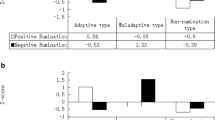Abstract
It has been proposed that the animal experiments on inescapable shock may serve as a model for PTSD in humans. Learned helplessness theory, which also derives from the experiments on inescapable shock, proposes that helplessness behavior in humans is the result of people's expectations about events which they perceive to be uncontrollable. The way a person explains or attributes cause to events which occur influences these expectations. The symptoms of PTSD and helplessness behavior heavily overlap. The present study tested whether there was, in fact, a relationship between a proven measure of the attributional style proposed by helplessness theory, the Attributional Style Questionnaire, and measures of PTSD in a group of 99 patients seeking treatment for alcohol dependence and/or pathological gambling. Consistent, significant relationships were found between learned helplessness attributional style and a variety of measures of PTSD. Also replicated were earlier reports of a relationship between coaddiction (alcohol and gambling) and symptoms of PTSD. The usefulness of learned helplessness theory in explaining PTSD and devising treatments for portions of the disorder are discussed.
Similar content being viewed by others
References
Abramson, L. Y., Seligman, M. E., and Teasdale, J. (1978). Learned helplessness in humans: Critique and reformulation.J. Abnorm. Psychol. 87: 49–74.
Fairbank, J. A., Keane, T. M., and Malloy, P. F. (1983). Some preliminary data on the psychological characteristics of Vietnam veterans with posttraumatic stress disorders.J. Consult. Clin. Psychol. 51: 912–919.
Gong-guy, E., and Hammen, C. (1980). Causal perceptions of stressful events in depressed and nondepressed outpatients.J. Abnorm. Psychol. 89: 662–669.
Horowitz, M. J. (1986). Stress-response syndromes: A review of Postrumatic and adjustment disorders.Hosp. Commun. Psychiatry 37: 241–249.
Jelinek, J. M., and Williams, T. (1984). Post-traumatic stress disorder and substance abuse in Vietnam veterans: Treatment problems, strategies and recommendations.J. Subst. Abuse Treat. 1: 87–97.
Keane, T. M., Caddell, J. M., Martin, B., Zimering, R. T., Fairbank, J. A. (1983). Substance abuse among Vietnam veterans with postrumatic stress disorders.Bull. Psychologists Addict. behav. 2: 117–122.
keane, T. M., Malloy, P. F., and Fairbank, J. A. (1984). Empirical development of an MMPI subscale for the assessment of combat related PTSTDJ. Consult. Clin. Psychol. 52: 888–891.
Krystal, H. (1984). Psychoanalytic views on human emotional damages. In van der Kolk, B. (ed.),Post-trumatic Stress Disorder: Psychological and Biological Sequelae American Psychiatric Press, Washington, D.C.
Lacoursiere, R. B., Godfrey, K. E., and Ruby, L. M. (1980). Traumatic neurosis in the etiology of alcoholism: Viet Nam combat and other trauma.Am. J. Psychiat. 137: 966–968.
Marlatt, G. A., and Gordon, J. R. (1985).Relapse Prevention Guilford Press, New York.
McCormick, R. A., and Taber, J. I. (1988). Attributional style in gamblers in treatment.J. Abnorm. Psychol. 97: 368–370.
McCormick, R. A., Taber, J. I., Kruedelbach, N., and Russo, A. (1987). Personality profiles of hospitalized pathological gamblers: The California Personality Inventory.J. Clin. Psychol. 43: 521–527.
Penk, W., Robinowitz, R., Black, J., and Skinner, J. (1987). MMPI subscale development among substance abusers. Paper presented at the Annual Meeting of the American Psychological Association, New York.
Peterson, C., Semmel, A., von Baeyer, C., Abramson, L. Y., Metalsky, G. I., and Seligman, M. E. (1982). The attributional style questionnaire.Cogn. Ther. Res. 6: 287–299.
Peterson, C., and Seligman, M. E. (1984). Causal attribution as a risk factor for depression: Theory and evidence.Psychol. Rev. 91: 347–374.
Ramirez, L. F., McCormick, R. A., Russo, A., and Taber, J. I. (1983). Patterns of substance abuse in pathological gamblers undergoing treatment.Addict. Behav. 8: 425–428.
Raps, C. S., Peterson, C., Reinhard, K. E., Abramson, L. Y., and Seligman, M. E. (1982). Attributional style among depressed patients.J. Abnorm. Psychol. 91: 102–108.
Robert, J. A., Ryan, J. J., McEntyre, W. L., McFarland, R. S., and Lips, O. J. (1985). MCMI characteristics of DSM-III posttrumatic stress disorder in Vietnam veterans.J. Personal. Assess. 49: 226–230.
Roberts, W. R., Penk, W. E., Gearing, M. L., Robinowitz, R., Dolan, M. P., and Patterson, E. T. (1982). Interpersonal problems of Vietnam combat veterans with symptoms of post-traumatic stress disorder.J. Abnorm. Psychol. 91: 444–450.
Roth, L. M. (1986). Substance use and mental health among Vietnam veterans. In Boulanger, G., and Kadushin, C. (eds.),The Vietnam Veteran Redefined Lawrence Elbaum Associates, Hillsdale, NJ., pp. 61–78.
Russo, A., Taber, J. I., McCormick, R. A., and Ramirez, L. F. (1984). An outcome study of an inpatient program for pathological gamblers.Hosp. Commun. Psychiat. 35: 823–827.
Seligman, M. E. P., Castellon, C., Cacciola, J., Schulman, P., Luborsky, L., Ollove, M., and Downing, R. (1988). Explanatory style change during cognitive therapy of unipolar depression.J. Abnorm. Psychol. 97: 13–18.
Taber, J. I., McCormick, R. A., and Ramirez, L. F. (1987). The prevalence and impact of major life stressors among pathological gamblers.Int. J. Addict. 22: 71–79.
van der Kolk, B., Greenberg, M., Boyd, H., and Krystal, J. (1985). Inescapable shock, neurotransmitters, and addict to trauma: Toward a psychobiology of post traumatic stress.Biol. Psychiatry 20: 314–325.
Whitman-Raymond, R. G. (1988). Pathological gambling as a defense against loss.J. Gambl. Behav. 4: 99–109.
Author information
Authors and Affiliations
About this article
Cite this article
McCormick, R.A., Taber, J.I. & Kruedelbach, N. The relationship between attributional style and post-traumatic stress disorder in addicted patients. J Trauma Stress 2, 477–487 (1989). https://doi.org/10.1007/BF00974603
Accepted:
Issue Date:
DOI: https://doi.org/10.1007/BF00974603




